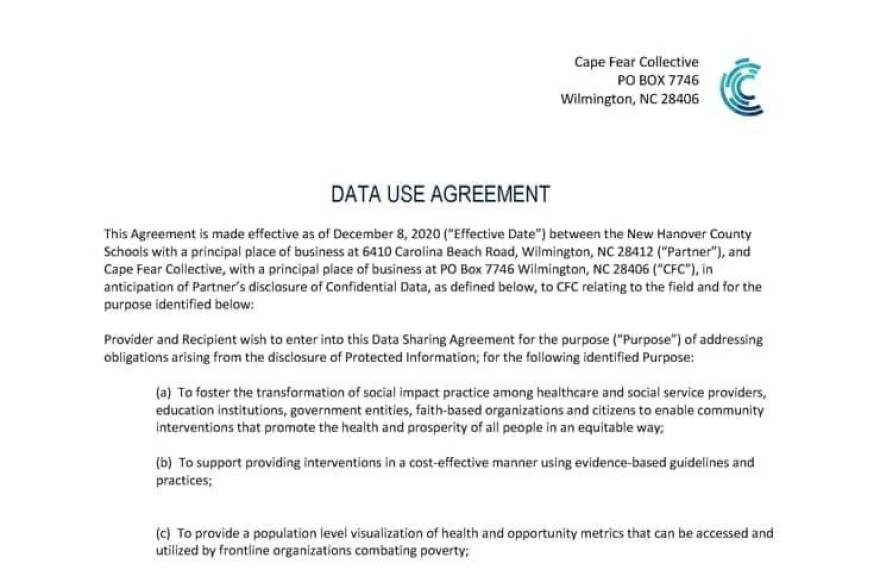On Tuesday, the New Hanover County Board of Education will vote on a data-sharing agreement with Cape Fear Collective. The proposed agreement, which includes references to confidential and protected information, has caused some concern. WHQR’s Ben Schachtman spoke with CFC’s CEO about the issue.
Ben Schachtman: Cape Fear Collective is a non-profit that uses data gathering and analysis to help provide a picture of the challenges facing southeastern North Carolina.
While CFC has worked with the county and several other local agencies and organizations, the proposed agreement with NHCS caught some off guard. Board members Stephanie Walker and Judy Justice took to social media to express concerns over student privacy and what kind of data the school was ‘giving away.’ In conversations with WHQR, both reiterated these points and noted that they weren’t given much context on the agreement ahead of this week’s meeting.
To help shed some light on these concerns, I'm joined now by Patrick Brien, CEO of Cape Fear Collective. Patrick, thanks for joining us.
PB: Thanks, Ben. Happy to be here.
BS: So this data-sharing document with New Hanover County Schools has caused a little bit of concern with at least two board members and some of the parents, largely because it mentions confidential and protected data. Can you speak to a little bit about what kind of data is actually being asked for and how this works?
PB: Sure, Ben. So I think the first thing I'd say it's important to note that the data use agreement is just an administrative framework for sharing data, it doesn’t entitle us to any data, doesn't give us access to any type of databases or systems or software platforms, on the school district side just lays out that process for how we want to share data if the school district wants to. So we're really what we're looking for is public data. And the reason being is that oftentimes, public data from state sites, it's messy, it's got holes in it. So it's a lot easier to get it from the source that is a lot more timely, it's a lot cleaner. But it also comes with the context of the school district and being able to kind of shape what that looks like. We never handle any kind of identified data. And so the language is really just in the agreement, because even though it is publicly available data, we still treat it as sensitive data. So we're just overprotecting on our protocols. They're just really trying to cover our bases in terms of data security.
BS: This is all data that a reporter or anyone else could request through a public records request... this is just a framework to make sure that both sides are comfortable with what's going on?
PB: Exactly. And again, a lot of it's just, you know, from one data analyst at the district to our data analysts, [it gets] into the way we like our data formatted and in terms of speed of analysis, and those types of things, granularity, all of that is just easier to do through data use agreement.
BS: The other part of this is, of course, data is a commodity, and several school board members have effectively asked, you know, we've learned a little bit about what Cape Fear Collective can do with this kind of data. But what's the benefit for the school specifically?
PB: Yeah, so I think the biggest thing we can help the district with is we can kind of help them understand the community their kids are living in. So you know, what are the challenges those communities face? And how do those challenges affect educational outcomes. And so we know, the teachers know it, administrators, parents, students, communities know a lot of those challenges. But by having this type of data, we're able to kind of quantify and correlate those relationships, using that data. And it makes interventions and programming to support our kids much easier to implement, much easier to track over the long term. So we're really looking at kind of the social determinants of education, painting a picture around that, that allows each community organization, nonprofit municipality to lean in our kids, regardless if they're working in healthcare, or housing or criminal justice.
BS: All right. And last thing is, you've mentioned this before, but the folks at Cape Fear Collective, you've said you're always welcome to have sit-downs with folks who want to understand more about this... how can people get in touch with you if they have more questions?
PB: Sure, they can reach out via our website at info@capefearcollective.org and we're happy to kind of get a meeting on the books, as soon as possible zoom, socially, distance in person, whatever, whatever it takes -- we're always eager to engage with leaders and community members, and really to learn to improve a lot of our processes and our aims, as we kind of do this work across the case your region.
BS: All right, well, Patrick Brien from Cape Fear Collective. Thank you so much for taking some time. We appreciate it.
PB: Thanks.
You can find more about Cape Fear Collective here -- and contact them here or at info@capefearcollective.org.
Editor's note: WHQR has partnered with Cape Fear Collective on several projects, but there is no financial or editorial relationship between the two organizations.


